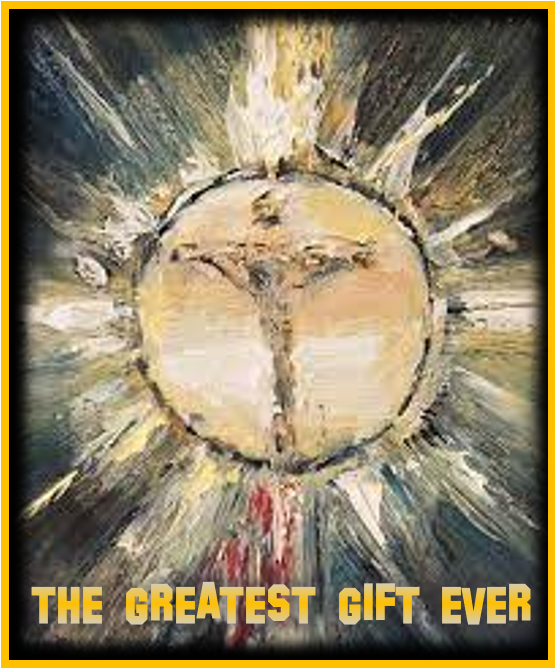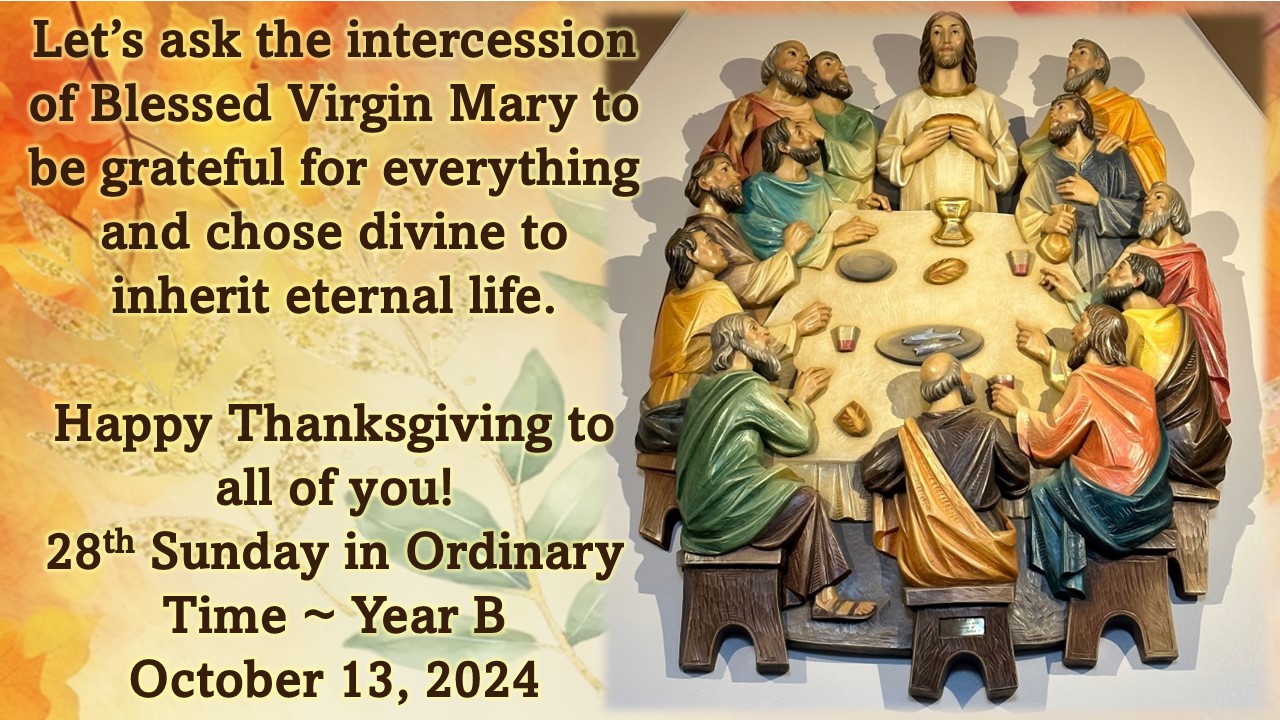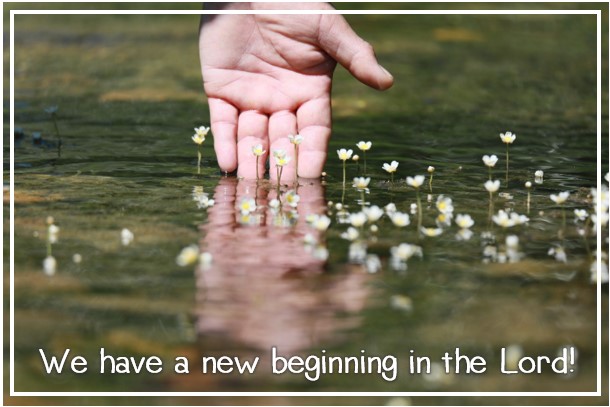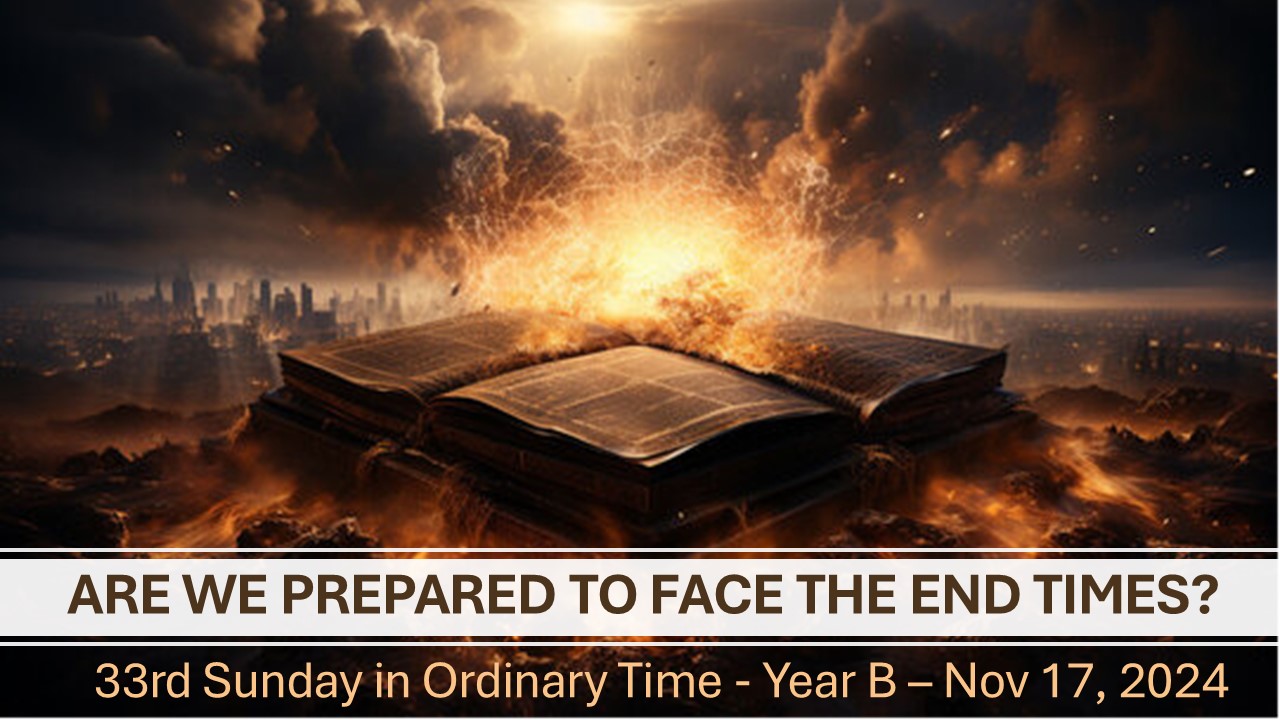
Solemnity of Precious Body & Blood of our Lord Year C ~ Sunday, June 19, 2022
Today we celebrate the Solemnity of Corpus Christi (Precious Body and Blood of our Lord) which keeps reminding us to break, share and give ourselves for others. According to the Catechism of the Catholic Church “Together with the anamnesis, the epiclesis is at the heart of each sacramental celebration, most especially of the Eucharist: You ask how the bread becomes the Body of Christ, and the wine . . . the Blood of Christ I shall tell you: the Holy Spirit comes upon them and accomplishes what surpasses every word and thought . . . Let it be enough for you to understand that it is by the Holy Spirit, just as it was of the Holy Virgin and by the Holy Spirit that the Lord, through and in himself, took flesh”.
The Sacrament of Holy Eucharist is the greatest gift anyone can imagine having, because in this Sacrament our Savior didn’t use the blood of the animals to purify us but he became the pure Lamb of sacrifice who blood has saved the world. The Author of Letter to Hebrews explains this mystery with profound faith and belief “But when Christ came as a high priest of the good things that have come, then through the greater and perfect tent (not made with hands, that is, not of this creation), he entered for all, into the Holy Place, not with the blood of goats and calves, but with his own blood, thus obtaining eternal redemption. For if the blood of goats and bulls, with the sprinkling of the ashes of a heifer, sanctifies those who have been defiled so that their flesh is purified, how much more will the blood of Christ, who through the eternal Spirit offered himself without blemish to God, purify our conscience from dead works to worship the living God!” (9:11-14).
Furthermore, we read in the Catechism of the Catholic Church that “The Eucharist is ‘the source and summit of the Christian life.’ ‘The other sacraments, and indeed all ecclesiastical ministries and works of the apostolate, are bound up with the Eucharist and are oriented toward it. For in the blessed Eucharist is contained the whole spiritual good of the Church, namely Christ himself, our Pasch.’ In brief, the Eucharist is the sum and summary of our faith: ‘Our way of thinking is attuned to the Eucharist, and the Eucharist in turn confirms our way of thinking.”
We all are familiar with the saying “we are what we eat” but I always wonder why we can’t become like our Savior whose Precious Body and Blood we eat and drink every day. This greatest must make us like Jesus so that everyone could feel that we are like our Master who have commanded to do “this in my memory”. I think this short story will also help us to learn to be like Jesus.
A few years ago, a group of salesmen went to a regional sales convention in Chicago. They had assured their wives that they would be home in plenty of time for Friday night’s dinner. In their rush, with tickets and briefcases in hand, moving quickly through the airport terminal, one of these salesmen inadvertently kicked over a table which held a display of apples. Apples flew everywhere. Without stopping or looking back, they all managed to reach the plane in time for their nearly missed boarding.
All but one! He paused, took a deep breath, quickly assessed the situation — and experienced a twinge of compassion for the girl whose apple stand had been overturned. He told his buddies to go on without him, waved good-bye, told one of them to call his wife when they arrived at their home destination and explain he was taking a later flight. Then, he returned to the terminal where the apples were still all over the terminal floor. The man was glad he did. The 16-year-old girl running the stand, he discovered, was totally blind! She was softly crying, tears running down her cheeks in frustration, all the while helplessly groping for her spilled produce as the rushing crowd swirled about her, no one stopping and no one caring for her plight.
No one else, that is. The salesman knelt on the floor with her, gathered up the apples, put them back on the table and helped organize her display. As he did this, he noticed that many of them had become battered and bruised. These he set aside in another basket. When he had finished, he pulled out his wallet and said to the girl, “Here, please take this $40 for the damage we did. Are you okay?” She nodded through her tears. “I hope we didn’t spoil your day too badly,” he said.
As the salesman started to walk away, the bewildered blind girl called out to him, “Mister…” He paused and turned to look back into those blind eyes. She continued, “Are you Jesus?” He stopped in mid-stride, and he wondered, stunned by the words. Then slowly, he made his way to catch the later flight with that question burning in his soul: “Are you Jesus?”
The story of Last Supper is actually a story of recognition of Jesus in our lives through his Precious Body and Blood. The CCC does explain this mystery in a very profound way “The Lord’s Supper, because of its connection with the supper which the Lord took with his disciples on the eve of his Passion and because it anticipates the wedding feast of the Lamb in the heavenly Jerusalem. Cor 11:20; Rev 19:9. The Breaking of Bread, because Jesus used this rite, part of a Jewish meat when as master of the table he blessed and distributed the bread, Gal 3:27. above all at the Last Supper. Mt 26:26; 1 Cor 11:24. It is by this action that his disciples will recognize him after his Resurrection, Lk 24:13-35. and it is this expression that the first Christians will use to designate their Eucharistic assemblies; Acts 2:42, 46; Acts 20:7, 11. by doing so they signified that all who eat the one broken bread, Christ, enter into communion with him and form but one body in him. 1 Cor 10:16-17. The Eucharistic assembly (synaxis), because the Eucharist is celebrated amid the assembly of the faithful, the visible expression of the Church. 1 Cor 11:17-34.”
Moreover “By celebrating the Last Supper with his apostles in the course of the Passover meal, Jesus gave the Jewish Passover its definitive meaning. Jesus’ passing over to his father by his death and Resurrection, the new Passover, is anticipated in the Supper and celebrated in the Eucharist, which fulfills the Jewish Passover and anticipates the final Passover of the Church in the glory of the kingdom. In the communion, preceded by the Lord’s prayer and the breaking of the bread, the faithful receive ‘the bread of heaven’ and ‘the cup of salvation,’ the body and blood of Christ who offered himself ‘for the life of the world’: Jn 6:51. Because this bread and wine have been made Eucharist (‘eucharisted,’ according to an ancient expression), ‘we call this food Eucharist, and no one may take part in it unless he believes that what we teach is true, has received baptism for the forgiveness of sins and new birth, and lives in keeping with what Christ taught.”
If from the beginning Christians have celebrated the Eucharist and in a form whose substance has not changed despite the great diversity of times and liturgies, it is because we know ourselves to be bound by the command the Lord gave on the eve of his Passion: “Do this in remembrance of me”. The Eucharist, the sacrament of our salvation accomplished by Christ on the cross, is also a sacrifice of praise in thanksgiving for the work of creation. In the Eucharistic sacrifice the whole of creation loved by God is presented to the Father through the death and the Resurrection of Christ. Through Christ the Church can offer the sacrifice of praise in thanksgiving for all that God has made good, beautiful, and just in creation and in humanity.”
Holy Father Pope Francis reflecting on this Solemnity says “Besides physical hunger, man experiences another hunger, a hunger that cannot be satiated with ordinary food. It’s a hunger for life, a hunger for love, a hunger for eternity. And the sign of manna — like the entire experience of Exodus — also contains in itself this dimension: it was the symbol of a food that satisfies this deep human hunger. Jesus gives us this food, rather, He himself is the living bread that gives life to the world (cf. Jn 6:51). His Body is the true food in the form of bread; his Blood is the true drink in the form of wine. It isn’t simple nourishment to satisfy the body, like manna; the Body of Christ is the bread of the last times, capable of giving life, eternal life, because this bread is made of love. The Eucharist communicates the Lord’s love for us: a love so great that it nourishes us with Himself; a freely given love, always available to every person who hungers and needs to regenerate his own strength. To live the experience of faith means to allow oneself to be nourished by the Lord and to build one’s own existence not with material goods but with the reality that does not perish: the gifts of God, his Word and his Body”.
St. Thomas Aquinas who had great love for the Holy Eucharist and wrote many hymns to explain the presence of the Savior, wrote a reflection “Since it was the will of God’s only Begotten Son that men should share in his divinity, he assumed our nature in order that by becoming man he might make men gods. Moreover, when he took our flesh, he dedicated the whole of its substance to our salvation. He offered his body to God the Father on the altar of the cross as a sacrifice for our reconciliation. He shed his blood for our ransom and purification, so that we might be redeemed from our wretched state of bondage and cleansed from all sin. But to ensure that the memory of so great a gift would abide with us forever, he left his body as food and his blood as drink for the faithful to consume in the form of bread and wine. O precious and wonderful banquet that brings us salvation and contains all sweetness! Could anything be of more intrinsic value? Under the old law it was the flesh of calves and goats that was offered, but here Christ himself, the true God, is set before us as our food. What could be more wonderful than this? No other sacrament has greater healing power; through it sins are purged away, virtues are increased, and the soul is enriched with an abundance of every spiritual gift. It is offered in the Church for the living and the dead, so that what was instituted for the salvation of all may be for the benefit of all. Yet, in the end, no one can fully express the sweetness of this sacrament, in which spiritual delight is tasted at its very source, and in which we renew the memory of that surpassing love for us which Christ revealed in his passion. It was to impress the vastness of this love more firmly upon the hearts of the faithful that our Lord instituted this sacrament at the Last Supper. As he was on the point of leaving the world to go to the Father, after celebrating the Passover with his disciples, he left it as a perpetual memorial of his passion. It was the fulfillment of ancient figures and the greatest of all his miracles, while for those who were to experience the sorrow of his departure, it was destined to be a unique and abiding consolation”.
Following are some quotes from the saints for us to reflect and meditate on the greatest gift we have received from the Lord and about whom St. Peter says “where to go because you have the words of eternal life Lord”.
“We must not separate our life from the Eucharist. The moment we do so, something shatters.” St Teresa of Calcutta
“The Church and the world have a great need for Eucharistic worship. Jesus awaits us in this sacrament of love. Let us not refuse the time to go to meet him in adoration.” Pope St John Paul II
“You left us yourself in the Sacrament of the Altar, and you opened wide your mercy to us. There is no misery that could exhaust you. You have called us all to this fountain of love, to this spring of God’s compassion.” St Faustina
“If I can give you any advice, I beg you to get closer to the Eucharist and to Jesus… We must pray to Jesus to give us that tenderness of the Eucharist.” St Teresa of Calcutta
“Lord Jesus Christ, pierce my soul with your love so that I may always long for you alone, who are the bread of angels and the fulfilment of the soul’s deepest desires. May my heart always hunger for you, so that my soul may be filled with the sweetness of your presence.” St Bonaventure
“We adore you, most holy Lord Jesus Christ, here, and in all your churches throughout all the world; and we bless you, because, by your holy cross, you have redeemed the world.” St Francis of Assisi
“Many people nowadays say, ‘I wish I could see his shape, his appearance, his clothes, his sandals.’ Only look! You see him! You touch him! You eat him!” St John Chrysostom
“The Eucharist is a fire which inflames us.” St John Damascene
“Not to go to Communion is like someone dying of thirst beside a spring.” St John Vianney
“Our sharing in the Body and Blood of Christ has no other purpose than to transform us into that which we receive.” Pope St Leo the Great
“Go often to Holy Communion. Go very often! This is your one remedy.” St Thérèse of Lisieux
“Through adoration, the Christian mysteriously contributes to the radical transformation of the world and to the sowing of the gospel. Anyone who prays to the Saviour draws the whole world with him and raises it to God.” Pope St John Paul II
“Jesus in the Blessed Sacrament is the Living Heart of each of our parishes.” Blessed Paul VI
“Do not think that Jesus Christ is forgetful of you, since he has left you, as the greatest memorial and pledge of his love, himself in the Most Holy Sacrament of the Altar.” St Alphonsus Liguori
“When the Sisters are exhausted, up to their eyes in work; when all seems to go awry, they spend an hour in prayer before the Blessed Sacrament. This practice has never failed to bear fruit: they experience peace and strength.” St Teresa of Calcutta
Let me finish my reflection with short story which will keep reminding us to be grateful for the gift of the Holy Eucharist.
Once upon a time, a man punished his 3-year-old daughter for wasting a roll of gold wrapping paper. Money was tight and he became infuriated when the child tried to decorate a box to put under the Christmas tree. Nevertheless, the little girl brought the gift to her father the next morning and said, “This is for you, Daddy.” He was embarrassed by his earlier overreaction, but his anger flared again when he found the box was empty.
He yelled at her, “Don’t you know that when you give someone a present, there’s supposed to be something inside it?” The little girl looked up at him with tears in her eyes and said, “Oh, Daddy, it is not empty. I blew kisses into the box. All for you, Daddy.”
The father was crushed. He put his arms around his little girl, and he begged for her forgiveness. It is told that the man kept that gold box by his bed for years and whenever he was discouraged, he would take out an imaginary kiss and remember the love of the child who had put it there.
There is no more precious possession anyone could hold other than the Holy Eucharist to remember our Savior broke and shared himself with us.
Other Sermons In This Series

28TH SUNDAY IN ORDINARY TIME YEAR B ~ OCTOBER 13, 2024
October 10, 2024

5th Sunday of Lent Year A ~ March 26, 2023
March 24, 2023

33rd SUNDAY IN ORDINARY TIME YEAR B ~ November 17, 2024
November 13, 2024

